Colloquia for Spring 2023
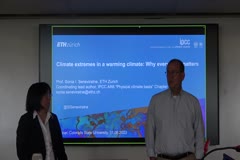
Climate extremes in a warming climate: Why every year matters
June 01, 2023
Sonia I. Seneviratne
Hosted by James Hurrell
In this presentation, I will provide an overview of recent developments on research on climate extremes, including the main conclusions of the 6th Assessment Report of the Intergovernmental Panel on Climate Change (IPCC AR6). For the first time, a full chapter of an IPCC assessment report was dedicated to the topic of weather and climate extremes (Seneviratne et al. 2021). The newest evidence…
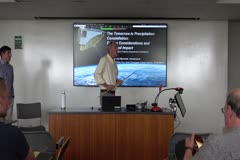
The Tomorrow.io Precipitation Constellation: Design Considerations and Expected Impact
May 04, 2023
Joe Munchak
Hosted by Chris Kummerow
On April 14, 2023, the Tomorrow-R1 Radar Pathfinder satellite launched aboard the SpaceX Transporter 7 mission. Tomorrow-R1 is the first of approximately 30 satellites that will make up the multi-modal Tomorrow.io precipitation constellation by the end of 2025, which will consist of 10-12 Smallsat Ka-band radars and up to 18 Cubesat microwave sounders. In order to optimize the design of this…
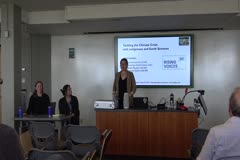
Rising Voices Panel: Tackling the Climate Crisis with Indigenous and Earth Sciences
April 27, 2023
Dr Cam Brinkworth; Dr DOminique David-Chavez; Dr Melissa Moulton; Dr Diamon Tachera
Hosted by Jim Hurrell and Emily Fischer
The Rising Voices Center for Indigenous and Earth Sciences (Rising Voices) facilitates opportunities for Indigenous and non-Indigenous scientific experts and community leaders from around the world to jointly address how extreme weather and climate events are impacting communities and to develop action plans. Rising Voices aspires to advance science through the collaborations of Indigenous and…
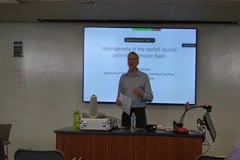
Heterogeneity of the rainfall diurnal cycle in the Amazon Basin
April 21, 2023
Maria Silva Dias
Hosted by Eric Maloney
The diurnal cycle of rainfall in the Amazon Basin will be presented based on the database of IMERG rainfall estimations. The subregions of the Amazon, with similar daily cycles, have been defined based on clustering analysis. From these results a discussion will be presented based on the regional aspects that may influence the diurnal cycle, including severe storms along the eastern slopes of…
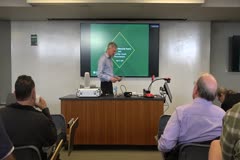
Herbert Riehl Memorial Award and Maria Silva Dias Award Recognition Ceremony
April 21, 2023
Various
Hosted by Department
Herbert Riehl Memorial Award and Maria Silva Dias Award Recognition Ceremony
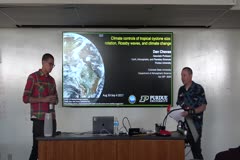
Climate Controls of Tropical Cyclone Size: Rotation, Rossby Waves, and Climate Change
April 20, 2023
Dan Chavas
Hosted by Michael Bell
Tropical cyclones cause widespread damage and loss of life globally each year. In a future warmer climate, tropical cyclones are expected to have stronger maximum wind speeds, but could they also get larger? This talk will discuss how I integrate theory, observations, idealized models, and global climate models to understand what sets the size of tropical cyclones on Earth. I will focus in…
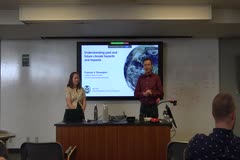
Understanding Past and Future Climate Hazards and Impacts
April 13, 2023
Frances Davenport
Hosted by Russ Schumacher
Climate hazards like severe precipitation, flooding, drought, and extreme heat disproportionately impact society and ecosystems, but are challenging to model and predict due to their complexity and rarity. Thus, there are still many unanswered questions about the processes that affect extremes in a changing climate, and how we can design systems to make society more resilient to these events.…
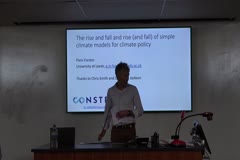
The Rise and Fall and Rise (and Fall) of Simple Climate Models for Projections of Surface Temperature
March 30, 2023
Piers Forster
Hosted by Dave Thompson
This talk will look at how simple physical climate models have, and have not, been used in Intergovernmental Panel on Climate (IPCC) Reports. It will detail how the IPCC Sixth Assessment Report chose to base its temperature and sea-level projections on such models, rather than CMIP6 models. Were we right to do this? Maybe not…
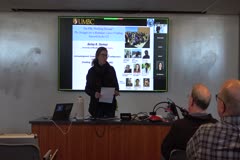
The PBL Profiling Decade? The Struggle for a Boundary Layer Profiling Network In the US
March 09, 2023
Belay B. Demoz
Hosted by Amanda Back and Emily Fischer
The PBL Profiling Decade? The Struggle for a Boundary Layer Profiling Network In the US The critical need for planetary boundary layer (PBL) profiling network in weather forecasting has been known since the mid-80’s and may be even before. Since that time, there have been so many studies that asked for the establishment of a national network of profiling observations of the thermodynamic…
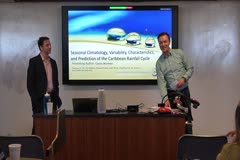
Seasonal Climatology, Variability, Characteristics, and Prediction of the Caribbean Rainfall Cycle
March 02, 2023
Carlos Martinez
Hosted by Russ Schumacher
The Caribbean and Central America hydroclimate is understudied and complex in part due to its data sparsity, varied topographies, and multi-faceted interactions with tropical and mid-latitude forcings. A refined and comprehensive understanding of the observed and simulated Caribbean hydroclimate is presented, using a variety of in-situ and satellite precipitation products, reanalysis, and…
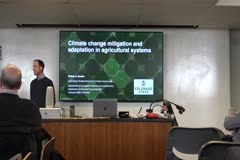
Climate Change Mitigation and Adaptation in Agricultural Systems
February 23, 2023
Nathan Mueller
Hosted by Pat Keys
Successfully mitigating and adapting to climate change will require major changes across global agricultural systems. Agriculture is responsible for around a quarter of global greenhouse gas emissions, and simultaneously climate change threatens agricultural livelihoods and food security around the world. Climate change impacts on agriculture are not only determined by changes in climate, but…
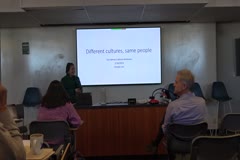
Cultural Jamboree
February 16, 2023
Yoonjin Lee; Gabrielle (Bee) Leung (ATS); En Li (ATS); Ying-Ju Chen (ATS); A.R. Ravishankara (ATS & CHEM)
Hosted by Department
Yoonjin Lee (CIRA) “Different Cultures, Same People” Gabrielle (Bee) Leung (ATS) “Collaborating Across Cultures” En Li (ATS) “Memorable Cultural Shocks” Ying-Ju Chen (ATS) “Social Awkwardness From Cultural Difference” A.R. Ravishankara (ATS & CHEM) “From a Student to a Professor”
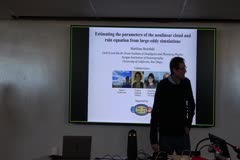
Predator prey dynamics and stratocumulus clouds
February 09, 2023
Matti Morzfeld
Hosted by Peter Jan van Leeuwen
Earth’s energy budget is a key quantity for our climate and how it changes. The reason is that stratocumulus clouds have a great effect on Earth’s energy budget because they cover vast amounts of our planet and reflect sunlight. It is thus important to understand and model stratocumulus clouds. In this talk, I will make connections between two very different models. The first model is a…
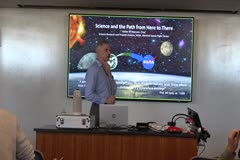
Science and the Path from Here to There
February 02, 2023
Walt Petersen
Hosted by Steve Rutledge and Eric Maloney
This talk will focus on the science career path of Dr. Walt Petersen, former CSU Atmospheric Science student and researcher, and recent 2022 Outstanding Alum Award Winner. The presentation will summarize science emphases he has pursued along a path originating with and winding through his tenure at CSU, to include topics in deep convection, lightning, precipitation science, and radar…
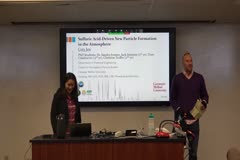
Sulfuric acid-driven new particle formation in the atmosphere
January 26, 2023
Coty Jen
Hosted by Jeff Pierce
Sulfuric acid is essential for atmospheric nucleation and originates from anthropogenic and biogenic sources. Experimental evidence is presented on how sulfuric acid reacts with a wide variety of compounds to form stable particles at different rates. A recently developed nucleation potential model is then used to capture how complex mixtures enhance sulfuric acid nucleation rates. This model is…
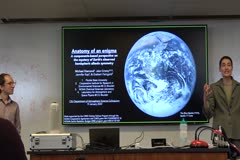
Anatomy of an enigma: A components-based perspective on the mystery of Earth's observed hemispheric albedo symmetry
January 19, 2023
Michael Diamond
Hosted by Maria Rugenstein
Since the 1960s, we have observed that Earth's Northern and Southern Hemispheres reflect identical amounts of sunlight to within measurement uncertainty, but we still don't know why this is the case and whether or not this hemispheric albedo symmetry is maintained by Earth system processes. Climate models do not systematically simulate hemispherically symmetric albedos and simple energy balance…
